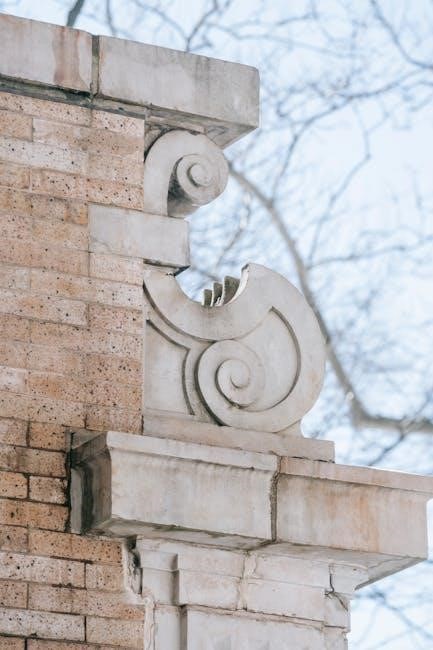“Checking Out Me History” by John Agard is a powerful poem that critiques Eurocentric narratives in education, emphasizing the omission of diverse cultural histories and identities.
1.1 Overview of the Poem’s Central Theme
The poem “Checking Out Me History” by John Agard revolves around the theme of identity and the critique of Eurocentric historical narratives. It explores how educational systems often prioritize Western achievements while marginalizing the histories and contributions of non-European cultures. The speaker reflects on their schooling, where figures like Florence Nightingale and Robin Hood were celebrated, while individuals like Mary Seacole were erased. This contrast highlights the exclusion of diverse voices and the impact it has on one’s sense of self. Agard’s work challenges this imbalance, urging readers to reclaim and explore their own cultural heritage. The poem serves as a powerful call for diverse representation in education and history.
1.2 Importance of the Poem in Modern Literature
“Checking Out Me History” holds significant importance in modern literature for its bold critique of Eurocentric narratives and its advocacy for diverse historical representation. The poem challenges traditional educational systems that often overlook the contributions of marginalized cultures, resonating with contemporary discussions on inclusivity and identity. Its use of personal and historical references makes it a powerful tool for fostering critical thinking and cultural awareness. By addressing these themes, Agard’s work has become a vital resource in educational settings, encouraging students to question dominant narratives and explore their own heritage. This makes the poem a cornerstone in discussions about decolonizing education and promoting diverse perspectives in literature.
1.3 Brief Biography of John Agard
John Agard, born in 1949 in British Guiana (now Guyana), is a celebrated poet, playwright, and educator. He moved to the UK in the 1970s, where he began advocating for Caribbean culture and identity. His experiences under colonial rule and later in Britain heavily influenced his work, particularly in addressing themes of identity, cultural heritage, and the impact of Eurocentric narratives. Agard’s poetry is known for its accessible style and powerful exploration of race, history, and belonging. His collection Half-Caste and Other Poems, which includes “Checking Out Me History”, reflects his commitment to challenging dominant historical perspectives and celebrating diverse voices. His work has made him a key figure in modern British literature, particularly in discussions around multiculturalism and education.

Historical Context of the Poem
“Checking Out Me History” reflects on colonialism’s impact on education, where Eurocentric narratives dominated, marginalizing indigenous and African histories, inspiring Agard’s critique of such systems.
2.1 Eurocentric Narratives in History Education
Eurocentric narratives dominate history education, often prioritizing Western achievements while marginalizing contributions from other cultures. In “Checking Out Me History”, John Agard highlights this imbalance by contrasting figures like Florence Nightingale with the overlooked Mary Seacole. This reflects how colonial-era education systems erased indigenous and African histories, leaving students disconnected from their heritage. The poem critiques this exclusion, emphasizing the need for diverse historical perspectives. By challenging Eurocentric narratives, Agard advocates for a more inclusive understanding of history, urging readers to reclaim and celebrate their own cultural roots. This theme resonates globally, addressing the systemic erasure of non-Western histories in educational curricula.
2.2 The Impact of Colonialism on Identity
Colonialism profoundly shaped identities by imposing Eurocentric narratives and erasing indigenous cultures. In “Checking Out Me History”, John Agard reflects on how colonial education marginalized non-Western histories, leaving individuals disconnected from their heritage. The poem highlights the psychological impact of being taught to valorize Western figures while neglecting one’s own cultural roots. This erasure fosters a fragmented sense of self, prompting a journey of rediscovery. Agard’s personal experience of growing up in Guyana under British colonial rule underscores the struggle to reclaim identity. The poem becomes a powerful act of resistance, urging individuals to confront colonial legacies and embrace their true histories. This theme resonates universally, emphasizing the lasting effects of colonialism on cultural identity and self-perception.
2.3 The Role of Education in Shaping Historical Perspectives
Education systems often perpetuate dominant narratives, marginalizing diverse histories. In “Checking Out Me History”, John Agard critiques how colonial education erased non-Western histories, fostering a narrow view of the past. The poem reflects on the speaker’s experience of being taught about Western figures like Florence Nightingale while their own cultural heroes, such as Mary Seacole, were ignored. This omission highlights how education can disconnect individuals from their heritage. Agard’s work challenges the system to reconsider its curriculum, advocating for inclusive histories. By questioning the Eurocentric bias in education, the poem emphasizes the need for diverse perspectives to shape a more equitable understanding of history and identity.

Key Themes in “Checking Out Me History”
The poem explores themes of identity, cultural heritage, and the critique of Eurocentric history. It highlights the power of reclaiming one’s history and resisting marginalization through education and self-discovery.
3.1 Identity and Cultural Heritage
The poem delves into the speaker’s journey of self-discovery, highlighting the tension between imposed Eurocentric narratives and their own cultural roots. Agard critiques how education systems often erase or marginalize non-European histories, leaving individuals disconnected from their heritage. The speaker reflects on being taught about figures like Florence Nightingale while their own cultural icons, such as Mary Seacole, are omitted. This erasure fuels a sense of alienation and prompts the speaker to reclaim their identity. Through creole language and personal reflection, Agard emphasizes the importance of understanding and celebrating one’s cultural heritage. The poem becomes a powerful statement about decolonizing education and asserting one’s rightful place in history, blending personal and collective experiences to challenge dominant narratives.
3.2 Critique of Eurocentric History
John Agard’s poem critiques the dominance of Eurocentric history in education, highlighting its exclusion of non-European cultures and figures. The speaker reflects on being taught about European heroes like Florence Nightingale while figures like Mary Seacole, a Caribbean nurse, are omitted. This erasure underscores the marginalization of minority histories. Agard challenges the notion that history begins with European exploration, emphasizing the importance of diverse perspectives. The poem critiques how Eurocentric narratives shape a narrow, biased understanding of the past, often at the expense of other cultures’ contributions. By questioning these omissions, Agard advocates for a more inclusive and equitable representation of history, urging readers to recognize the value of overlooked voices and experiences.
3.3 The Power of Reclaiming One’s History
Reclaiming one’s history is central to the poem, as it empowers individuals to reconnect with their cultural heritage and challenge dominant narratives. The speaker reflects on the erasure of their history, emphasizing the need to reclaim and celebrate it. By asserting their identity, the speaker resists marginalization and fosters pride in their roots. This act of reclaiming history is not only a personal journey but also a collective call to action, urging others to explore and value their own histories. The poem highlights the emotional and psychological liberation that comes from reclaiming one’s past, rejecting the silence imposed by Eurocentric education. Ultimately, it underscores the importance of self-definition and the power of reclaiming history as a form of resistance and empowerment.
3.4 Resistance Against Marginalization
The poem serves as a powerful resistance against the marginalization of non-European histories and identities. By highlighting the omission of figures like Mary Seacole, Agard challenges the dominance of Eurocentric narratives. The speaker’s journey from ignorance to awareness symbolizes a broader resistance, rejecting the erasure of diverse cultures. Through this resistance, the poem emphasizes the importance of reclaiming and celebrating one’s heritage. The speaker’s transformation from passive acceptance to active questioning mirrors the collective struggle of marginalized communities. By asserting their identity and history, the poem inspires others to resist systemic exclusion and demand a more inclusive understanding of the past. This resistance is both personal and political, fostering empowerment and challenging the status quo;

Literary Devices Used in the Poem
“Checking Out Me History” employs Creole language, juxtaposition of historical figures, and symbolism to challenge Eurocentric narratives, while its rhythm and meter enhance its emotional impact and authenticity.
4.1 Use of Creole Language
The poem “Checking Out Me History” incorporates Creole language to reflect the speaker’s cultural identity and challenge Eurocentric narratives. This linguistic choice creates a vivid contrast between the standardized English of education and the rich, authentic voice of the Caribbean diaspora. By blending Creole with English, Agard emphasizes the beauty and validity of non-European cultural expressions. The use of Creole also serves as a form of resistance, reclaiming and celebrating marginalized histories. This linguistic duality not only enriches the poem’s texture but also underscores its central theme of identity and the importance of diverse perspectives in historical narratives. The Creole language becomes a powerful tool for storytelling and cultural preservation.
4.2 Juxtaposition of Historical Figures
In “Checking Out Me History”, John Agard employs juxtaposition to contrast European historical figures with overlooked Caribbean and African figures. For instance, he mentions Florence Nightingale and Robin Hood, while highlighting the omission of Mary Seacole. This contrast underscores the Eurocentric bias in education, where non-European contributions are marginalized. By placing these figures side by side, Agard challenges the dominance of Western narratives and celebrates the histories of the Caribbean diaspora. This technique not only emphasizes the exclusion of diverse voices but also provokes a deeper reflection on the selective nature of historical storytelling. The juxtaposition serves as a powerful critique of colonial education systems and their impact on identity formation.
4.3 Symbolism in the Poem
“Checking Out Me History” is rich in symbolism, with historical figures and objects representing broader cultural and identity themes. Florence Nightingale’s lamp symbolizes Eurocentric narratives of heroism, while Mary Seacole’s absence reflects the erasure of Black contributions. The poem also uses light as a metaphor for knowledge and awakening, contrasting the speaker’s journey from darkness to self-discovery. The act of “checking out me history” itself symbolizes empowerment, as the speaker reclaim their identity and challenge colonial narratives. These symbols emphasize the struggle between imposed histories and the reclaiming of one’s cultural heritage, making the poem a powerful exploration of identity and resistance against marginalization.
4.4 Rhythm and Meter
The poem “Checking Out Me History” features a rhythmic structure that enhances its emotional impact and cultural resonance. Written in free verse, it employs a conversational tone that mirrors the speaker’s reflections and frustrations. The use of Creole language adds a unique cadence, blending Caribbean dialects with English, creating a musical quality that underscores the speaker’s identity. The rhythm is steady yet flexible, allowing for a natural flow that mirrors the speaker’s journey of discovery. This choice of meter emphasizes the poem’s accessibility and authenticity, making it feel like a personal narrative. The interplay of rhythm and language highlights the tension between the imposed Eurocentric history and the speaker’s reclaimed identity, adding depth to the poem’s themes of resistance and empowerment.

Analysis of Specific Lines
Key lines like “Dem tell me bout Florence Nightingale” and “But dem never tell me bout Mary Seacole” highlight the contrast between Eurocentric narratives and overlooked histories, evoking frustration and resistance.
5.1 “Dem tell me bout Florence Nightingale and she lamp”
“Dem tell me bout Florence Nightingale and she lamp” reflects the speaker’s frustration with Eurocentric education. Florence Nightingale, a British nurse, symbolizes the glorification of Western figures, while the omission of Mary Seacole highlights the erasure of non-European contributions. This line underscores the imbalance in historical narratives, where colonial perspectives dominate, marginalizing other cultures. The use of “lamp” as a symbol of Nightingale’s humanitarian work contrasts sharply with the invisibility of Seacole’s contributions, mirroring the speaker’s alienation from their own heritage. This line serves as a powerful critique of how history is selectively taught, emphasizing the need for diverse representation and challenging the dominance of Eurocentric views in education.
5.2 “But dem never tell me bout Mary Seacole”
“But dem never tell me bout Mary Seacole” is a poignant line that highlights the omission of non-European figures in historical narratives. Mary Seacole, a Jamaican-Scottish nurse who played a significant role in the Crimean War, is often overshadowed by Florence Nightingale in British education. This line underscores the Eurocentric bias in history teaching, where contributions from diverse cultures are marginalized or ignored. The speaker’s frustration stems from being denied knowledge of their own heritage, symbolizing the broader erasure of non-Western histories. By juxtaposing Nightingale and Seacole, Agard critiques the selective nature of historical education and advocates for a more inclusive understanding of the past, emphasizing the importance of reclaiming overlooked stories and identities.
5.3 “I carving out me identity”
“I carving out me identity” is a powerful declaration of self-discovery and resistance. The speaker asserts their agency in reclaiming and defining their own identity, which has been obscured by Eurocentric education. The use of “carving” suggests an active, deliberate process of shaping and reclaiming one’s heritage. This line reflects the speaker’s journey from ignorance to awareness, rejecting the imposed narratives of colonial history. By carving out their identity, the speaker resists marginalization and embraces their cultural roots. The phrase emphasizes the importance of self-discovery and the empowerment that comes from understanding and valuing one’s own history and heritage. It highlights the transformative power of reclaiming identity in the face of erasure and systemic oppression.
5.4 “Now I checking out me own history”
“Now I checking out me own history” marks a pivotal moment of empowerment and self-discovery. The speaker transitions from passive acceptance of Eurocentric narratives to an active pursuit of their own cultural heritage. This line signifies a rejection of the limited, colonialist history they were taught and an embrace of their true identity. By “checking out me own history,” the speaker reclaim their voice and challenge the erasure of marginalized cultures. This declaration underscores the importance of agency in shaping one’s understanding of the past and highlights the transformative power of reclaiming and celebrating one’s heritage. It serves as a call to resist systemic omission and to seek out diverse, inclusive narratives that reflect the richness of all cultures.

The Poem’s Relevance to Education
The poem challenges Eurocentric curricula, promoting diverse perspectives and critical thinking in students. It encourages educators to incorporate marginalized histories, fostering inclusivity and cultural awareness in classrooms.
6.1 Challenges in History Curriculum
The poem highlights the limitations of history curricula dominated by Eurocentric narratives, which often marginalize non-Western cultures and figures. This exclusion perpetuates a skewed understanding of global history, denying students the opportunity to engage with diverse perspectives. Agard’s critique underscores the need for educational reform to address these omissions, fostering a more inclusive and balanced approach to teaching history. By challenging the dominance of Western historical figures, the poem advocates for the integration of underrepresented voices, enabling students to develop a broader and more equitable understanding of the past. This aligns with the growing demand for curriculum diversity in modern education systems.
6.2 Promoting Diverse Perspectives in Schools
Promoting diverse perspectives in schools is essential for fostering inclusivity and understanding. The poem emphasizes the importance of incorporating underrepresented voices, such as Mary Seacole, to balance Eurocentric narratives. By introducing diverse historical figures and experiences, educators can enrich students’ understanding of global history. This approach not only challenges stereotypes but also encourages empathy and cultural awareness. Schools should actively seek to include marginalized stories, ensuring that all students see their identities reflected in the curriculum. This inclusive practice helps create a more equitable learning environment and prepares students to engage with a multicultural world. Such reforms align with the poem’s message of reclaiming and celebrating diverse histories.
6.3 Encouraging Critical Thinking in Students
The poem inspires students to question the historical narratives they are taught, fostering critical thinking. By highlighting omissions like Mary Seacole’s contributions, it encourages students to analyze and challenge Eurocentric bias. This critical engagement helps students develop a deeper understanding of history’s complexities. The poem’s message empowers learners to seek diverse perspectives, moving beyond a single, dominant viewpoint. Educators can use the poem to teach analytical skills, such as identifying gaps in historical accounts and evaluating evidence. By promoting inquiry and reflection, the poem equips students with tools to think independently and critically about the world. This approach not only enhances academic skills but also prepares students to engage thoughtfully with societal issues. Critical thinking, as encouraged by the poem, is essential for fostering informed, empathetic, and open-minded individuals.
Reception and Legacy of the Poem
“Checking Out Me History” has had a significant impact on poetry and literature, widely used in educational settings, and holds cultural significance, inspiring discussions on identity and history.
7.1 Impact on Poetry and Literature
“Checking Out Me History” has significantly influenced poetry and literature by challenging Eurocentric narratives and inspiring discussions on identity and marginalized histories. Its unique voice and powerful message have made it a widely studied and celebrated poem in educational settings. The poem’s use of Creole language and personal experiences has set a new standard for blending cultural identity with literary critique. It has also encouraged poets to explore themes of identity and history, making it a landmark work in contemporary poetry; The poem’s ability to resonate with diverse audiences has solidified its place in literary canon, fostering a deeper understanding of the importance of inclusive storytelling.
7.2 Use in Educational Settings
“Checking Out Me History” is widely used in educational settings to teach students about identity, history, and cultural perspectives. The poem is included in GCSE curriculums, where it serves as a tool for exploring themes of identity and challenging Eurocentric narratives. Teachers use it to encourage critical thinking and discussions about diverse histories. Resources such as lesson plans, worksheets, and revision guides are available to help students analyze the poem deeply. Activities like poetry detective tasks and web quests further enhance engagement. The poem’s accessibility and relevance make it a valuable asset for fostering empathy and understanding in students. Its inclusion in educational materials highlights its importance in modern literary education.
7.3 Cultural Significance
“Checking Out Me History” holds profound cultural significance as it challenges Eurocentric narratives and amplifies marginalized voices; The poem resonates deeply with individuals from diverse backgrounds, offering a powerful exploration of identity and heritage. By blending personal and collective histories, Agard creates a bridge between cultural roots and modern realities. The use of Creole language adds authenticity, reflecting Agard’s Caribbean heritage and making the poem relatable to many. It inspires readers to reclaim their histories and challenge dominant narratives. The poem’s cultural impact lies in its ability to foster empathy, break stereotypes, and celebrate diverse perspectives, making it a vital work in contemporary literature and cultural discourse.
“Checking Out Me History” is a powerful critique of Eurocentric education, urging readers to reclaim their cultural identities and challenge historical narratives for a more inclusive future.
8.1 Summary of Key Points
“Checking Out Me History” by John Agard critiques Eurocentric education, highlighting the omission of non-European histories and the importance of reclaiming cultural identity. Through personal reflection, the poem challenges dominant historical narratives, emphasizing the need for diverse perspectives. Agard’s use of Creole reflects his Caribbean heritage, adding authenticity to the voice. The poem underscores the impact of colonialism on identity and education, urging individuals to explore their own histories. By juxtaposing figures like Florence Nightingale with Mary Seacole, Agard exposes historical biases. Ultimately, the poem advocates for empowerment through self-discovery and the rejection of marginalization, offering a powerful message about identity, resistance, and the importance of inclusive education.
8.2 Final Thoughts on the Poem’s Message
“Checking Out Me History” delivers a profound message about identity, cultural heritage, and the need to challenge Eurocentric narratives. Agard’s poem highlights the importance of reclaiming one’s history and resisting marginalization. By sharing his personal journey, Agard emphasizes the transformative power of self-discovery and the necessity of diverse representation in education. The poem serves as a call to action, urging individuals to question dominant historical accounts and seek out their own truths. Its legacy lies in its ability to inspire critical thinking and empower individuals to embrace their identities, fostering a more inclusive understanding of history and culture.
